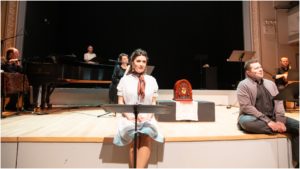
Roulette Intermedium 2019 Review: What’s Left of Me Is Here
Lauren Flanigan, Mario Diaz-Moresco Lead Preview of Joan La Barbara’s ‘Dreams of Water Beyond One’s Depth’
By Jennifer PyronRoulette recently presented world-renowned vocalist and sound artist Joan La Barbara’s “What’s Left of Me Is Here,” from her opera-in-progress with librettist Monique Truong titled “Dreams of Water Beyond One’s Depth.”
Pushing boundaries of thought and expression via singing and an emotionally vast range of design, La Barbara’s musical composition is reminiscent of Britten’s “The Turn of the Screw.” Together, a brilliantly suited piano, flute, glass and sampler composition, played by Miguel Frasconi, and cello composition, played by Bryan Hayslett, heightened the story-telling of hardship involving two characters with guidance and vitality.
Discovering Two Lives Affected By Loss
Librettist Truong manages to interweave the complicated lives of two individuals at different time periods by bringing them together on a psychological plane where one can examine each of their psyches based on the core of their existence as survivors in the throes of their own mental turmoil.
In direct correlation to what is happening in the world during the time frame of character Virginia W’s life, sung by Lauren Flanigan, the opera takes an interesting and modern approach by playing radio clips and samples of station tuning that invite listeners to discover not only more information pertaining to the storyline, but most importantly more ways to direct sound composition within an opera. In one particular clip, La Barbara and Truong focus on an ad that sponsors Johnson for President and says “ These are the stakes. To make a world in which all of God’s children can live, or to go into the dark. We must either love each other, or we must die.”
This strong message relates to the intensity felt by humanity during this time and is also the underlying message of commonality sensed by both characters Virginia W and Joseph C.
Baritone Mario Diaz-Moresco, as Joseph C., showcased intelligent depiction of his character and profound sensitivity towards the material. He sang a recurring theme of vocal swells with ease by navigating a smooth vocal transition between falsetto and middle range.
During the conversation he has with the NYPD Homicide Detective, played by Joe Jacobs, Diaz-Moresco’s character struggles with identifying himself while the detective asks him to identify the body of a girl he once knew.
Compositionally this scene was poignant in effect because the mixing of Jacobs’ voice through the telephone alongside Diaz-Moresco’s singing in response to the detective’s questions was accompanied by an expressive cello that left one feeling unsettled and curious about Joseph C’s role in the death of the girl named Joyce.
Understanding What Is Left To Be As Important As What Was Lost
“In Joseph’s Dream” is sung by the character Joyce while she writes a letter and describes fond memories with Joseph. Soprano Julia Meadows sang with crisp and lively diction that flourished. Meadows portrayed a young Joyce full of life and naivety that was palpable in every way. While Joseph remembers moments spent with Joyce, he also questions their interactions and intentions especially when he sings: “Mother’s room filled with the questions, I could never ask. Why did you leave The Strand without saying goodbye? Why did you steal When everything in this house, this heart, is already yours? Why won’t you say Yes to this old fool and Utopia Parkway?”
It is at the moment of Joyce’s response in the letter to these questions that Joseph understands her intentions of being with him all along, however it is too late. In this moment, Diaz-Moresco collapsed on stage and evoked a wail that permeated everyone in the hall.
The next scene takes one back to where Virginia remembers the moment where she lost her innocence as a young girl. In this, Flanigan sang with emotional conviction and connection as she described the horror experienced by her character. Her voice created an aura of overtones that brought to life a guttural response to the severe humiliation she described.
During the retelling of Virginia’s past, La Barbara sang the role of Virginia’s Internal Voice and reiterated important discoveries along the way: “Would you have us wait for fear, like a defenseless child? Would you have us wait for horror, like a mere woman? Would you have us wait for death, like a damn coward?”
At the end of Virginia’s scene, sample clips of the sounds of protest and rioting of the U.S. in 1964 are played and merge with the sounds of the WWII bombing of London. All of this ties into Virginia’s current life and role as a bystander in the midst of both external and internal war. The scene then closes by emphasizing the direct correlation between both characters, Joseph and Virgina, as they live their lives in response to significant loss, while singing “what’s left of me is here.”
(Photo Credit: Damijan Saccio)


